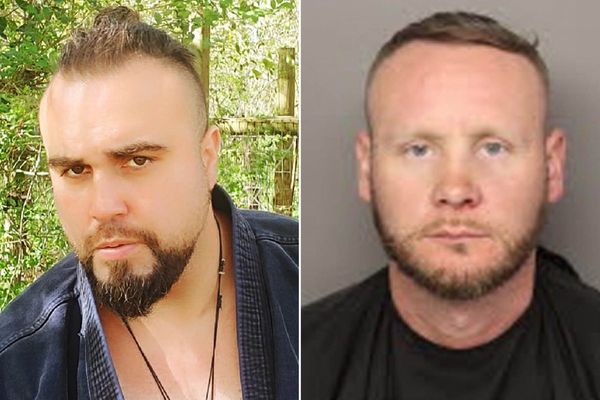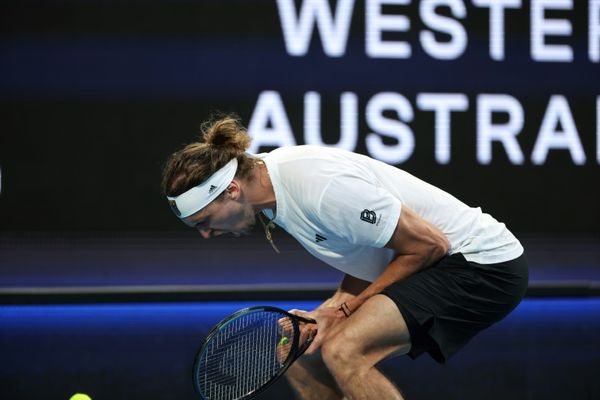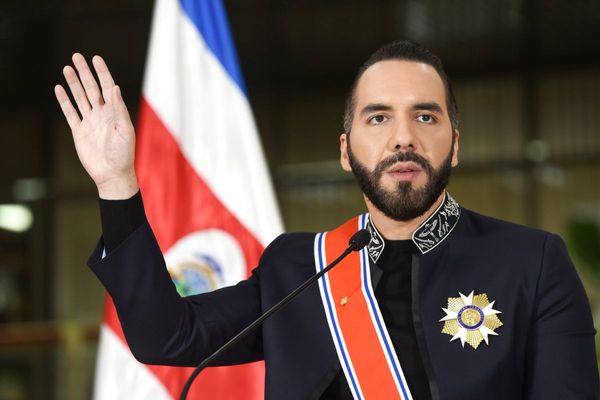
It’s questionable whether any of us will ever forget John Howard’s penchant for naff. It was his preternatural gift; his will to power. Combined with his cruel streak of mendacity, tin-can nationalism and vacant conscience, he of the green and gold tracksuit powerwalks personified naff in all its imposing and ponderous vulgarity.
To the nation’s eternal embarrassment, however, his many disciples since have continually tried to defy this basic truth and test the limits of our optimism. Scott Morrison, beer in hand, guffawing as he brandished a Cronulla Sharks scarf in a lasso? Naff. Repeating the heresy? Outrageously naff. Malcolm Turnbull pretending to like his Socceroos scarf as he snapped selfies with sporting legends? Also naff. And Tony Abbott, not content with visually assaulting the country in his many lycra-clad displays of competition, but billing us for the tremendous privilege? Too naff for words.
This is conservative Australia laid bare. Not only a pantheon of low expectations, norm trashing, outright lies and pandering but a glistening anthology of naff, a slang term that has come to mean shades of crass gaudiness that knows no bounds.
Yet in a troubling portent for the country, there are hints this spectacle of naff is beginning to seep beyond LNP studio productions and into the professional sporting arena itself. Throughout the recent AFL grand final series, for instance, spectators and guests were pointedly asked to remove their hats, beanies and caps as they solemnly stood for the national anthem. What followed were flashes of confused faces and awkward side-glances, beamed into lounge rooms across this vast continent in a vibe that can only be described as deeply unserious and, yes, catastrophically naff.
Some of course might argue that any rendition of the national anthem at a local sporting event is naff in itself, if only because it so plainly exposes the gauzy façade of sport as a sacrosanct, neutral space where politics fades from view. Others might counter that the same observations already find reflection in each and every politician who’s ever exploited professional sport for partisan gain. All true, and obviously so.
Taken together, their utility for present purposes lies in the light they cast on the many unwelcome, quintessentially Howard forays into the Voice debate this year, chief among them the time the former prime minister went on a splenetic rant at pro-Voice sporting bodies for involving themselves, as he saw it, in “partisan political debates”.
It was a “thoroughly bad development” for organisations like the NRL and AFL to express support for the Voice, the known cricket tragic insisted in May, adding, with as much integrity as an ashtray on a motorcycle, that it broke that “great rule of politics and sport not mixing”.
Cue his standard issue spirit-mirror, Opposition Leader Peter Dutton, who emerged with all the self-respect of the magnanimously wasted to tell Australians the declared Yes positions of these sporting bodies was not only wrong in principle but had unmasked the presence of “elites within sport”. As history will record, Dutton then trailed off into the abyss of the unhinged, drawing on a palette of lies, conspiracies and a sprinkle or two of his appalling “Orwellian” intuitions over the Voice. And there loomed the impending fragmentation — what writer James Parker might call a Sartrean “splitting of minds” — in this great and grand country of ours.
For conservatives, distortion of reality has long constituted something of a national pastime, which is why Howard and co’s particular rewriting of history here should surprise no-one. The idea professional sport has ever been politically and culturally neutral belongs to the realm of absurd. From the raised black-gloved fists of sprinters Tommie Smith and John Carlos in the 1968 Olympics to the boycott of apartheid South Africa and the Kaepernick kneel of yesterday, politics and sports have always mixed.
We know the AFL, in particular, has for decades reflected the best and worst of Australian society. After all, the chances of any of us forgetting the storm of anguish Adam Goodes was forced to endure both on and off the field are spectacularly unlikely, as are the recent racism scandals that engulfed the Collingwood and Hawthorn football clubs.
The same is true of Sam Newman, who once took to blackface to impersonate the great Nicky Winmar and described George Floyd as a “piece of shit”. Separated by some 20 years, the first “gaffe” proved yet another consequence-free moment for Newman, but the latter did not. A similar arc eventually trapped former Collingwood president Eddie McGuire, who was eventually banished in a frisson of awfulness, but not before comparing Goodes to King Kong and musing at “drowning” journalist Caroline Wilson.
The organisational search-and-rescue missions inspired by this shadow wasteland of racism and sexism were never so much a salute to wokeness as they were a testament to the pressure brought to bear by the public and its shifting values. But it’s a symbiotic relationship, and one that tends to ebb and flow, as the players’ taking of the knee for Black Lives Matter and the AFL’s stance on women in sport and marriage equality attest. In different ways, each speaks to the unifying power of sport as a force for good: proactive as opposed to necessarily reactive, even as problems continue to snicker around the edges.
All of which lends the AFL’s conscious decision to mute its declared support for the Voice in the final series an air of the bizarre. It’s possible the AFL was persuaded the Voice debate had become altogether too heated and therefore too chancy for PR purposes. But the reality is that silencing promotion of the Yes case was a political act in itself so far as it reinforced the status quo — which, as we know, is ultimately what the No position stands for.
Extending forgiveness to this folly might have been possible were it not for the AFL’s separate decision to inject an added layer of naffness into the finals by asking people to remove their hats for the national anthem. It was very enthralling, but not in a good way. All the Howards and Abbotts out there would have swelled with pride, while the hearts of Indigenous activists and supporters would have clenched. The national anthem, after all, politicises the sport, and commanding visible allegiance to it and a flag many see as divisive does away with any pretence of a politics-free zone.
It also brings to the fore the moral confusion of the idea that the nation should feel justifiable pride in our servicemen and women and sporting heroes, but not shame in the long shadow of the nation’s darker history. For after all, the position adopted by the AFL only amplifies that sad misconception.
In the end, the only person who dared to stand for the Yes side at the AFL grand final was Indigenous singer and songwriter Jess Hitchcock, who wore a black dress emblazoned with Yes messaging as she performed “Waltzing Matilda”.
Yesterday she told me of the terror she felt before her performance: not the singing part — “singing never makes me nervous” — but the decision to wear the Yes dress: “I was so scared about walking out on to the pitch and having 100,000 people seeing the Yes dress and booing me. I knew the online hate would come, and it did. But [the booing] didn’t happen, so that was good.”
Not only was Hitchcock not booed, nor was the Welcome to Country or Norm Smith recipient Whadjuk-Ballardong Noongar man Bobby Hill. Any concerns on that score the AFL conceivably had never came to pass.
And so to Hitchcock’s mind, the AFL (and the NRL) squandered their leadership opportunity. Though the AFL board gave Hitchcock permission to wear the Yes dress, it ultimately hid behind her (and the legion of sports stars who support the Voice), or if not that, then against her by choosing to calcify the status quo. “Think how amazing it would have been if I wasn’t the only person there to stand up for the Yes campaign,” she said. “If a sportsperson had done it, you know, my thing would have been completely mute.”
Hitchcock has a point, and one shared by the famed sociologist Harry Edwards: nothing is quite as powerfully inspiring or unifying as sport — not fashion or popular music, and not our universities.
When I asked what she hoped she had conveyed by her dress, Hitchcock said it was simple: to implore people to see through the thickets of misinformation out there and recognise the reality that Australia is already living the case of No, and it’s failing, miserably so. “If you believe Aboriginal people deserve better, this is the opportunity for you to support that,” she said.
Naturally, out-naffing the likes of Howard and his caravan of cant will always be a Sisyphean task. He’s naffness personified; a pathetic malady of naffness in all its fatuous shapes and forms.
But casting a vote based on fear, lies, misinformation and the wholly unserious appeal conservatives make to the patriotism of equal rights but not the reality of equality is undoubtedly one way of doing so. So the question is, will the millions who watched Hitchcock listen to her message, or will they turn away, as the AFL did at the eleventh hour?
We’ll soon know how truly naff this country is.
Do you agree John Howard has as much integrity as an ashtray on a motorcycle? Or even less? Let us know by writing to letters@crikey.com.au. Please include your full name to be considered for publication. We reserve the right to edit for length and clarity.







